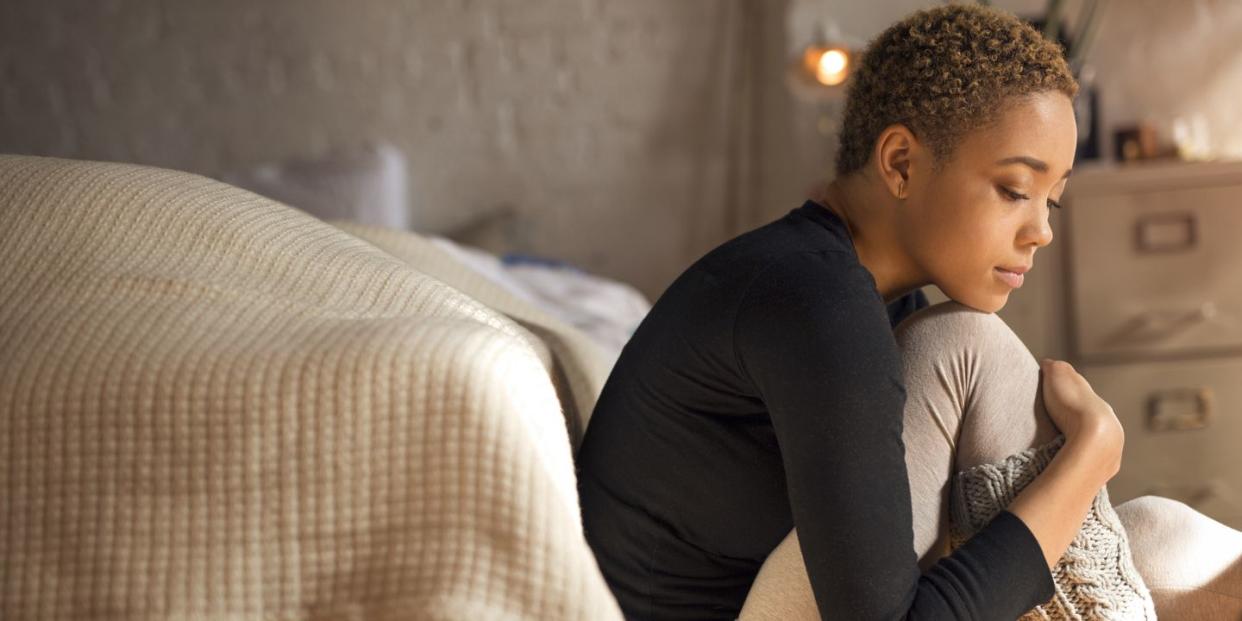Reports of Poor Mental Health Up 360% Since Covid-19 Pandemic

One thing is for sure, 2020 has been a year like no other. With an increasing number of reports warning that the nation’s mental health is deteriorating as a result of the global pandemic, we wanted to know how living through the crisis has affected your mind and mood.
So, we asked you, our readers, to open up about what’s really going on for you. We received thousands of replies; here’s what you told us...
However you're feeling, you can be sure, you're not alone. (Scroll down for advice and coping strategies.)

Of the over 2,500 of you who responded, 70.3% said that your mental health had got worse since the pandemic began, while 85.2% are concerned about the long-term effect lockdown may have on yourself or others.

When explaining the challenges of the past six months, 65.5% of you cited not being able to see family as a negative factor, whereas 47.4% claimed ‘worrying about the virus’ has had an adverse impact and 30.3% had concerns over their job security.

While the global health crisis left us all fearing for our physical wellbeing, you told us that there were countless other concerns and negative emotions that arose as a result of Covid-19.

For 27% of you it was the loneliness and isolation that made the greatest impact, while for 19%, it was the fear of friends and family catching the virus.
Other factors included fear of catching the virus yourself, finanical worry, concern for your loved ones' lockdown circumstances and troubles in your relationships.

Before lockdown, just 10% of you said your mental health was poor (you’re struggling but just about managing to function) or very poor (you’re not coping), compared with 46% of you now.

As for the coping mechanisms you’ve called upon to relieve stress in lockdown, exercise has been key: 48% of you used HIIT workouts to help keep your fitness routine alive, 46% caught the running bug and 39% of you Zenned out with the help of yoga.
For the rest of the time you were stuck indoors? 50% whiled away those hours reading, 41% of you baked, 39% of you decluttered and 38% did some serious cleaning.
Other strategies you leaned on were less constructive – for instance, 33% of you tried to ease stress by drinking more alcohol.

While 47% of you said that social media has helped you stay connected with loved ones you’re not able to see as often as before the pandemic, for others, it fuelled negative comparisons.
37% of you said it made you feel like you weren’t doing as well as others, and 33% of you said it made you feel lazy because others were doing so much more.

Where do we go from here?
85% of you agree that you’re concerned about the long-term impact of lockdown on yourself and others, while 51% say you’re more likely to reach out to loved ones struggling with their mental health and 43% of you say you’re now thinking about seeking treatment for your own mental health.

‘The mental health of our nation has been under the spotlight more than ever due to the unbelievable strains of Covid-19, but it’s quite shocking to see the extent it has affected women,’ says Claire Sanderson, Editor-in-Chief of Women’s Health UK.
‘What’s perhaps most alarming are the fears for longer-term mental health issues. That’s why it’s crucial for all women not to be ashamed in speaking up about their mental wellbeing, and they must reach out for help if they feel they are struggling,’ adds Sanderson.
What can you do to feel better?
1. Schedule mental health breaks
When you’re pulled in all directions – especially as a parent – it often ends up being the case that your ‘me time’ gets consumed by work. ‘But this is a recipe for burnout,’ says Dr Sarah Vohra, consultant NHS psychiatrist and author of The Mind Medic: Your 5 Senses Guide To Leading A Calmer, Happier Life (£16.99, Penguin Life).
‘To break the habit, allow yourself 20 to 30 minutes of actual you time and diarise it.’ Rope in a friend or family member to help hold you accountable, too.
2. Build boundaries around social media
‘Invest in an alarm clock to allow you to keep the first hour of your day screen free,’ suggests Dr Vohra. That way, you can avoid the temptation to scroll first thing, and consequently prevent any comparison-induced negativity hijacking your day.
‘Things are hard enough right now, and you’re at your most vulnerable right after you wake up,’ she adds.
What about if you need help right now?
1. Tell someone you trust that you’re struggling
Whether it’s a partner, relative, colleague or friend – no one gets through a period of poor mental health (especially during a global pandemic) on their own.
2. Call your doctor
‘Make contact with your GP and book an appointment,’ says Dr Vohra. ‘Don’t worry about “burdening the NHS”; your mental health matters and NHS doctors are working and ready to help you.’
3. Access therapy for less
If you work full-time, ask HR about an employee assistance programme. Or seek online therapy options such as Talkspace. Need the human touch? ‘Lots of therapists have lower-cost therapy slots,’ says psychotherapist Julia Samuel. ‘It’s not rude to ask.’
4. Alert professionals if you’re feeling suicidal
Feeling like you want to end your life is a health emergency and needs to be treated as such. Call the Samaritans on 116 123 or your local NHS mental health crisis team. If you’re making plans to take your own life, call 999 for urgent medical attention.
Cut through the noise and get practical, expert advice, home workouts, easy nutrition and more direct to your inbox. Sign up to the WOMEN'S HEALTH NEWSLETTER.
You Might Also Like

 Yahoo News
Yahoo News 
